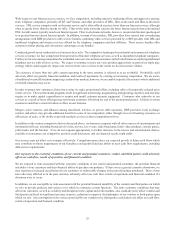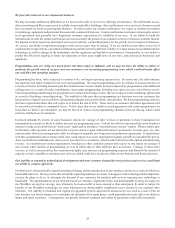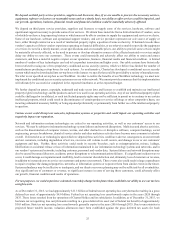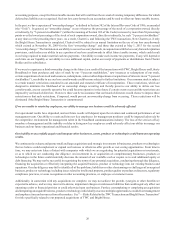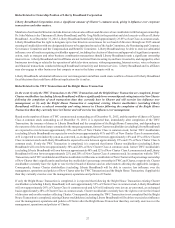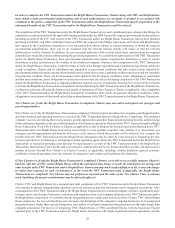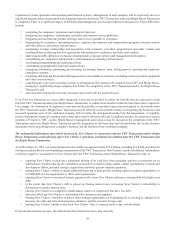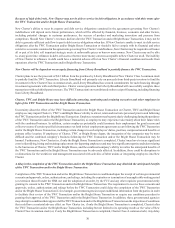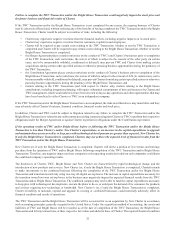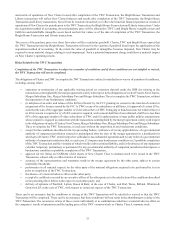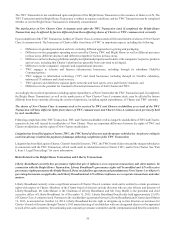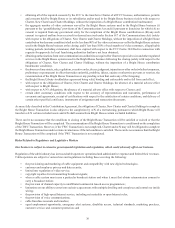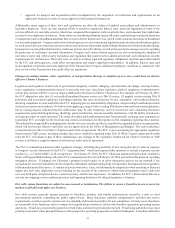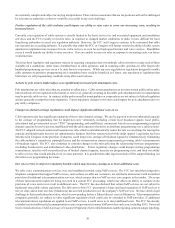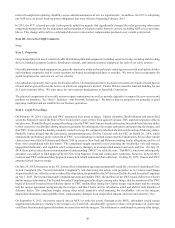Charter 2015 Annual Report Download - page 45
Download and view the complete annual report
Please find page 45 of the 2015 Charter annual report below. You can navigate through the pages in the report by either clicking on the pages listed below, or by using the keyword search tool below to find specific information within the annual report.30
Because of high debt levels, New Charter may not be able to service its debt obligations in accordance with their terms after
the TWC Transaction and/or Bright House Transaction.
New Charter’s ability to meet its expense and debt service obligations contained in the agreements governing New Charter’s
indebtedness will depend on its future performance, which will be affected by financial, business, economic and other factors,
including potential changes in customer preferences, the success of product and marketing innovation and pressure from
competitors. Should New Charter’s revenues decline after the TWC Transaction and/or Bright House Transaction, it may not be
able to generate sufficient cash flow to pay its debt service obligations when due. If New Charter is unable to meet its debt service
obligations after the TWC Transaction and/or Bright House Transaction or should it fail to comply with its financial and other
restrictive covenants contained in the agreements governing New Charter’s indebtedness, New Charter may be required to refinance
all or part of its debt, sell important strategic assets at unfavorable prices or borrow more money. New Charter may not be able
to, at any given time, refinance its debt, sell assets or borrow more money on terms acceptable to New Charter or at all. The inability
of New Charter to refinance its debt could have a material adverse effect on New Charter’s financial condition and results from
operations after the TWC Transaction and/or Bright House Transaction.
New Charter will be dependent on an equity financing from Liberty Broadband to partially finance the TWC Transaction.
Charter plans to use the proceeds of $4.3 billion from the purchase by Liberty Broadband of New Charter Class A common stock
to partially fund the TWC Transaction. Liberty Broadband will primarily rely on proceeds from third-party investors to fund the
investment in New Charter Class A common stock, and Liberty Broadband has secured commitments for such financing through
investment agreements with such third parties. Charter cannot guarantee that Liberty Broadband will successfully complete these
transactions with such third-party investors. The TWC Transaction is not conditioned on the receipt of financing, including financing
from Liberty Broadband.
Charter, TWC and Bright House may have difficulty attracting, motivating and retaining executives and other employees in
light of the TWC Transaction and the Bright House Transaction.
Uncertainty about the effect of the TWC Transaction and/or the Bright House Transaction on Charter, TWC and Bright House
employees may impair Charter’s, TWC’s and Bright House’s ability to attract, retain and motivate personnel prior to and following
the TWC Transaction and/or the Bright House Transaction. Employee retention may be particularly challenging during the pendency
of the TWC Transaction and/or the Bright House Transaction, as employees may experience uncertainty about their future roles
with the combined business. In addition, certain employees potentially could terminate their employment for good reason and
collect severance if certain specified circumstances set forth in their employment agreements occur following the TWC Transaction
and/or the Bright House Transaction, including certain changes in such employees’ duties, position, compensation and benefits or
primary office location. If employees of Charter, TWC or Bright House depart, the integration of the companies may be more
difficult and the combined company’s business following the TWC Transaction and/or the Bright House Transaction may be
harmed. Furthermore, New Charter (or, if only the Bright House Transaction is completed, Charter) may have to incur significant
costs in identifying, hiring and retaining replacements for departing employees and may lose significant expertise and talent relating
to the businesses of Charter, TWC and/or Bright House, and the combined company’s ability to realize the anticipated benefits of
the TWC Transaction and/or the Bright House Transaction may be adversely affected. In addition, there could be disruptions to
or distractions for the workforce and management associated with activities of labor unions or integrating employees into New
Charter.
A delay in the completion of the TWC Transaction and/or the Bright House Transaction may diminish the anticipated benefits
of the TWC Transaction and/or the Bright House Transaction.
Completion of the TWC Transaction and/or the Bright House Transaction is conditioned upon the receipt of certain governmental
consents and approvals, orders, authorizations, and rulings, including the expiration or termination of any applicable waiting period
(or extension thereof) under the HSR Act and the adoption of an order, by the FCC and any other requisite governmental entity
granting its consent to the TWC Transaction and/or the Bright House Transaction. The requirement to receive these consents and
approvals, orders, authorizations and rulings before the TWC Transaction could delay the completion of the TWC Transaction
and/or the Bright House Transaction if, for example, government agencies request additional information from the parties in order
to facilitate their review of the TWC Transaction and/or the Bright House Transaction or require any conditions precedent to
granting their approval of the TWC Transaction and/or the Bright House Transaction. In addition, these governmental agencies
may attempt to condition their approval of the TWC Transaction and/or the Bright House Transaction on the imposition of conditions
that could have a material adverse effect on New Charter (or, if only the Bright House Transaction is completed, Charter) after
the TWC Transaction and/or the Bright House Transaction, including but not limited to its operating results or the value of New
Charter Class A common stock (or, if only the Bright House Transaction is completed, Charter Class A common stock). Any delay





